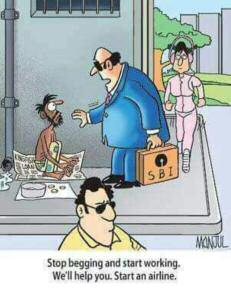“Does it have to be communism?” asked a friend. “Couldn’t there be a fairer capitalism where everyone’s basic needs were met?”
 Yes, to the first. No to the second – and don’t be fooled by “Universal Basic Income” schemes.
Yes, to the first. No to the second – and don’t be fooled by “Universal Basic Income” schemes.
If everyone’s basic needs were met, who would slave for pennies in capitalism’s worst jobs? How would capitalists use desperate unemployed workers to force down all workers’ wages? How would they maximize profits amidst their system’s deepening crisis?
That won’t be a problem in communism. Humans need useful work. We need to feel connected. When nobody is exploited, few will choose to loaf around.
Social ties will replace money as the link between production and use. Our dedication to work will flow from our sense of responsibility to each other.
Workers will organize their own work to make it safer, cleaner, easier. Who will do tasks that nobody wants? Those who are most committed to serving the masses – especially communist leaders.
People will gain confidence in the communist society that is meeting their needs. They will be inspired that nobody lives better or worse than others. More will become communist leaders.
Work in Communism and Capitalism
US capitalists lie about nearing “full employment.” Still, they worry about “the future of work.”
A recent study predicted that nearly half of today’s jobs will be gone in 25 years. Both manufacturing (“blue-collar”) and professional (“white collar”) jobs will be automated. There will be some new jobs building and servicing computers and robots, but not many.
In communism, nobody will need “jobs” in order to survive and flourish. We’ll all share the products of our collective work, according to need.
At first there will be a lot of hard work. We’ll be building communism on a planet devastated by capitalism and its deadly wars. We’ll have to support our sisters and brothers everywhere who are still fighting for communist power. But later, when we don’t have to work as hard, we’ll have more time for other things.
More workers will meet and study to make decisions that affect our lives. We’ll spend time strengthening social ties. We’ll get enough sleep and exercise. More of us will do scientific research. More will practice arts and crafts and music.
This is impossible under capitalism. Capitalists don’t automate work to relieve drudgery. They must do it to reduce the unit cost of their products so they can compete for market share. Their rate of profit tends to fall, so they must try to sell more. Competition sharpens. That leads inevitably to the massive destruction of human and other productive resources – including world war.
Meanwhile, masses of unemployed workers can’t buy stuff that capitalists must sell. Capitalists expanded credit to get around that. But now many workers can’t even make minimum payments.
Capitalists also shift production from necessities to luxuries, since those few who do have money have a lot. But this contributes to the sharpening of class contradictions. Masses of struggling workers (employed and unemployed) grow increasingly angry.
The New York Times (NYT) dedicated a recent magazine to this crisis and the idea of solving it with a “universal basic income” (UBI) plan. In UBI, everyone gets unconditional cash payments. Pilot projects have been tried in parts of Kenya, Finland, Namibia, Macao and Iran. It’s up for discussion in Latin America. Mexico City may write UBI into its new city constitution.
High-tech US billionaires, the NYT reported, are “obsessed with basic income… as a palliative for the societal turbulence its inventions might reach.” That means: massive unemployment and extreme inequality created by the “computer revolution” could trigger rebellions and even workers’ revolution.
We’re organizing for that revolution, with communism as the goal.
“Basic Income” may sound like a radical idea. It’s not.
In India, the fascist Modi government released a report in January proposing to replace subsidies of essentials like food and fuel with a “standard basic income” (SBI) of about 7,620 rupees ($112) per person each year.
The money would go directly into banks, aiding the bankers. But a third of Indian adults have no bank account. They couldn’t get “their” money. And the report admits it would be too costly to lift all Indians above the poverty line.
This report hypocritically proposed giving a “basic income” only to women. It says this would recognize non-wage labor (housework) as a real social contribution. But even a maid in Kolkata makes about 5000 rupees per month, about eight times the proposed “basic income.”
When communism abolishes wage-labor, distinctions between wage-slavery and unpaid domestic work will disappear. The material basis will exist to end the gender division of labor and sexism in all aspects of life.
Free-market guru Milton Friedman peddled UBI. Arch-racist Charles Murray pushes it now in the U.S..
Murray proposes grants of up to $10,000/year/person (plus $3000 for health insurance) to replace ALL federal welfare and social-services programs and “the bureaucracies that oversee them.”
Compare this to the official 2016 poverty level (about $12,000). And over 1/3 of the total US population (official count) would lose food assistance. About half would lose some kind of federal benefit. Everyone’s basic needs would NOT be met.
The NYT articles sparked a lively e-mail discussion. One friend wrote:
“Work seems fundamental to life, in a way that capital is not … For me, ‘to work’ and ‘to live’ are linked, and they are unconnected to ‘making a living.’”
We shouldn’t believe, he continued, “that one must deserve one’s share of the collective access to scarce resources [or] that goods, no matter how cost-free to produce, should not be available unless paid for.” That is: everyone should get what they need, period.
That’s why we must rely on more new communist organizers to mobilize masses for communism – starting right now, as we prepare for May Day.

This cartoon from India Resists exposes the racism of the Modi government’s “Basic Income” plans
Published 3/17/2017

